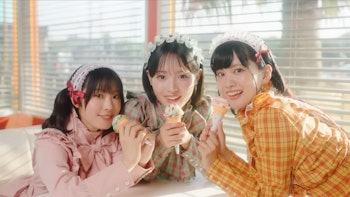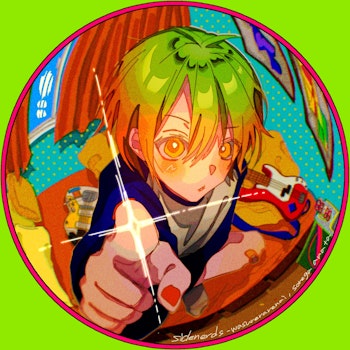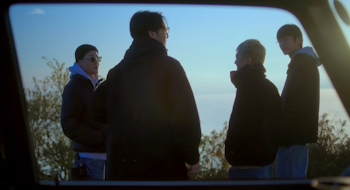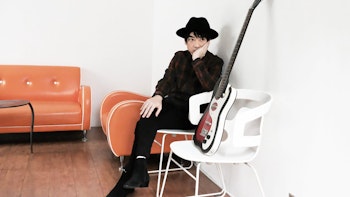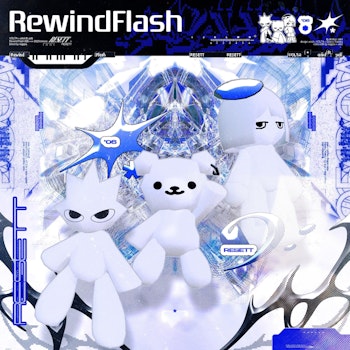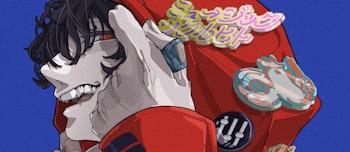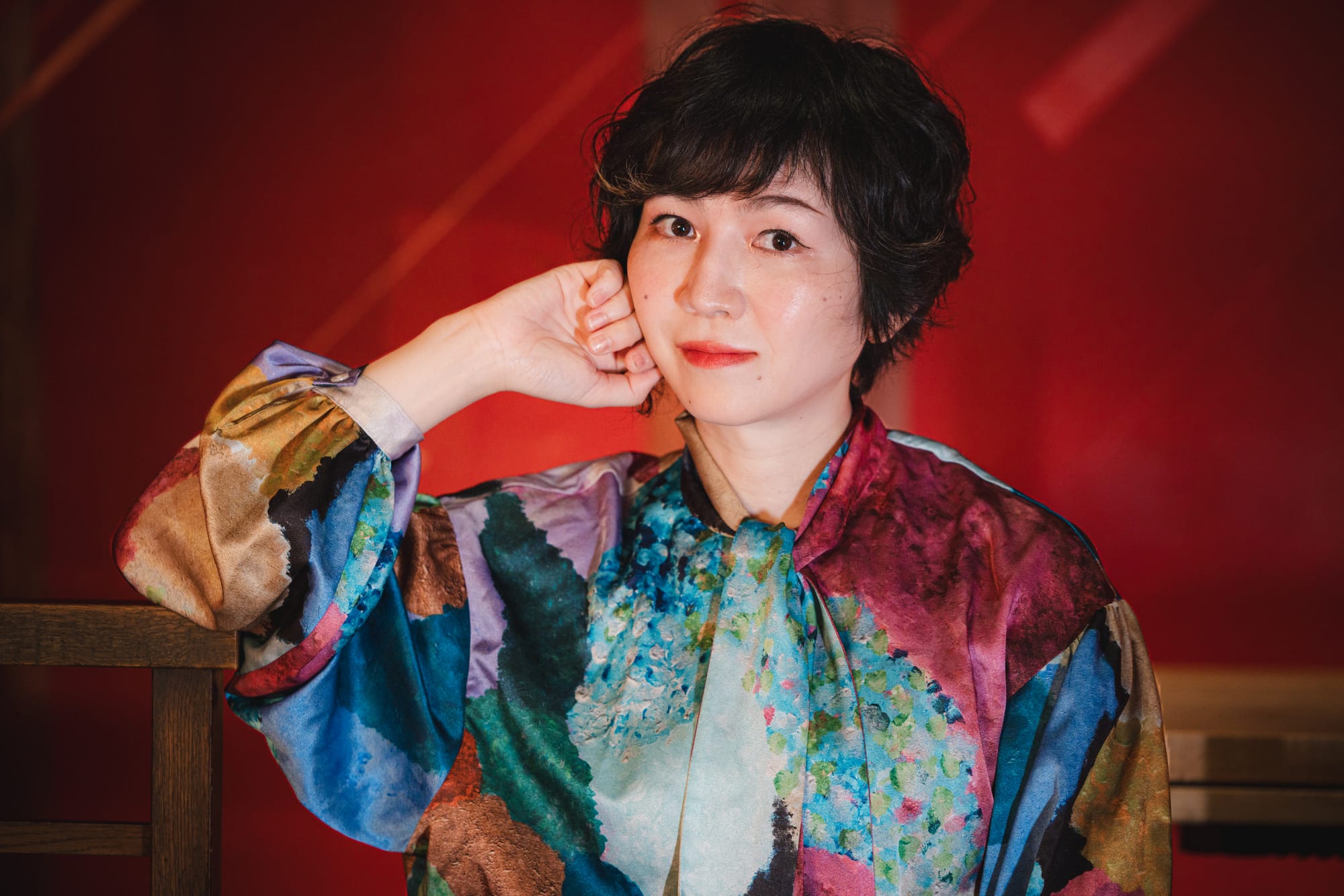
Yuki Kawamura has been a staple of Tokyo’s dance music community for years, whether as a DJ, producer for others, or operator of the “warm-up” bar Oiran located right at the entrance of Shibuya’s Dogenzaka area.
That business, however, also stopped the 46 year old from having the chance to create her own original music for years. Yet that changed in recent years.
“I had time during the pandemic, I thought, why not try using music software again?” Kawamura tells scrmbl from the upper floor of Oiran — across from the venue’s DJ booth, in front of a wall covered in signatures from artists who have stopped by to spin. “And when I did, I realized how much things had evolved in the past two decades.”
Encouraged by breakthroughs in technology and moved by the death of Spanish DJ and artist José Padilla in 2020 — a friend and mentor figure to her — Kawamura refocused her creativity towards the escapist sounds of Balearic on Love Forever, released this past June. Her debut full-length unfolds at a peaceful pace at times bordering on ambient, though often catching the breeze to remain in motion. She brings in violinist and Sheena Ringo collaborator Neko Saito to add grace to the opening number “R.I.P Sunset” and recruits Okinawan singer Naz for a cover of what Kawamura says is her favorite song ever, Padilla’s “Adios Ayer.”
“Balearic music, to me, is music that makes you feel like you’re in paradise. But reality is getting harsher and harsher around the world. So even if it’s just while listening to music, I want people to feel a little happiness, a little peace,” she says. “I want them to relax, to feel kindness, to feel love and a sense of eternity.”
It’s just the latest achievement for a fixture of Tokyo club culture and someone who has helped introduce Japanese dance sounds to the world. Kawamura helped produce several songs on the soundtrack to the popular video game Cyberpunk 2077, while also working with a variety of other artists over the course of her career. And then there’s Oiran, opened in 2010 as a place where people and artists could come to prepare for a night of clubbing ahead, with the space often featuring sets to prep for the evening ahead.
We caught up with Kawamura at Oiran on a rainy Tuesday night to talk about her first album, the influence of Padilla, the changing state of Tokyo’s club culture and much more. It has been edited for length and clarity.
scrmbl: The main reason we’re chatting today is that you recently released your first album, Love Forever. How did it come to fruition at this point in your life?
KAWAMURA: Throughout my professional career, I’ve done many different things, but it’s only this year that I finally released my first album. So why now? Why did I choose this timing to make the album? Actually, I stopped making music once, about 20 years ago, in my mid-twenties. Life just got really busy, and I had to put that aside. I eventually joined Sony and became a composer, producing and songwriting for other people, while also launching this venue and continuing to DJ.
But then COVID-19 hit, and things became difficult, right? During that time, mindfulness and meditation started trending. One of my old friends, who thought I was still making music, approached me and asked, "Would you like to make some mindfulness music for a fashion brand’s upcoming promotion?" Since I had time during the pandemic, I thought, why not try using music software again? And when I did, I realized how much things had evolved in the past two decades. I thought, “Wow, it’s actually easy to get back into making music now.” It has progressed so much over those 20 years.
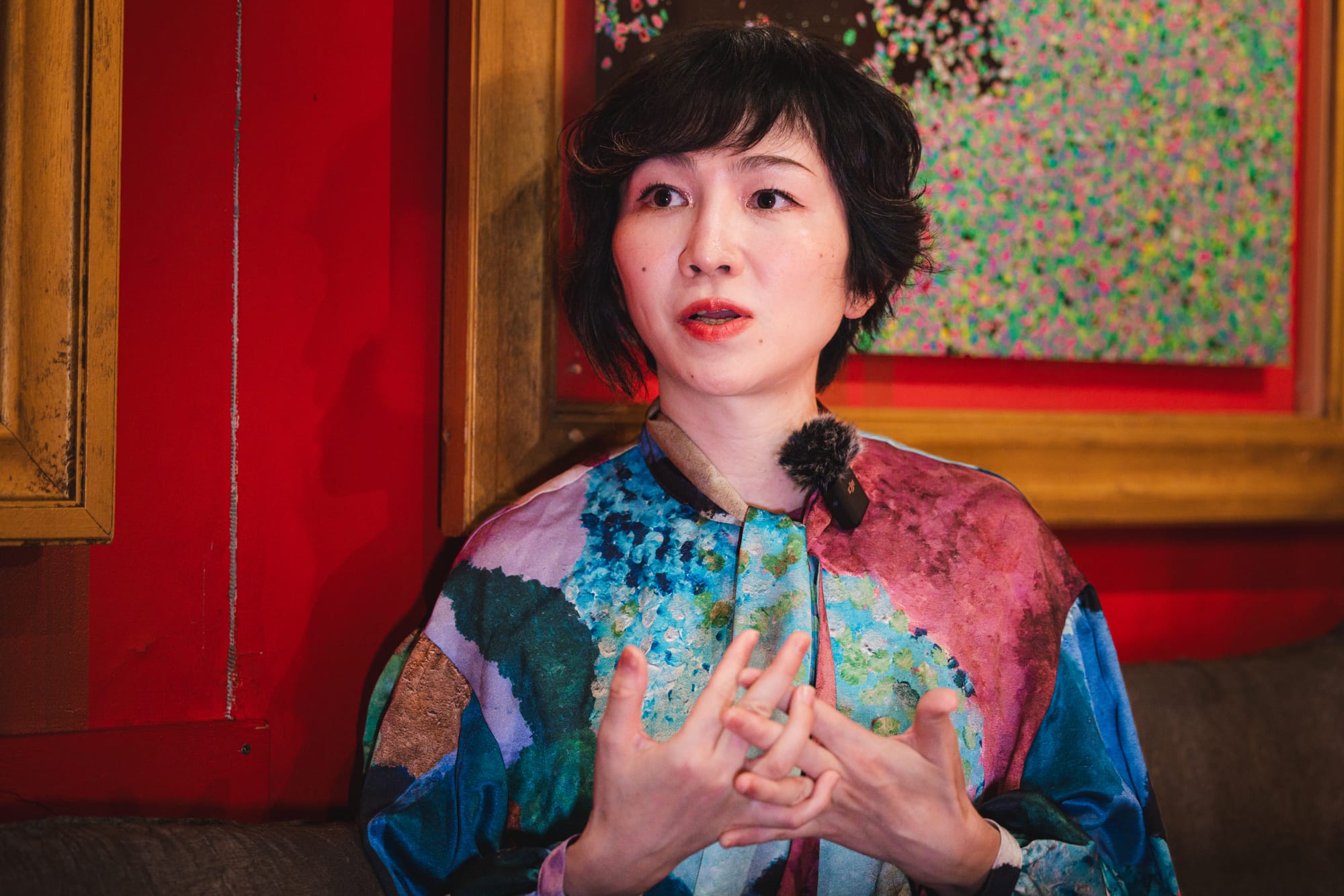
So I started again, first with some mindfulness tracks but then I remembered my roots — Café del Mar in Ibiza, and the DJ José Padilla. He had recently passed away, so I composed a tribute track for him called “R.I.P. Sunset.” That reignited something in me. There’s a magazine here in Japan called Sound & Recording, and the editor-in-chief really encouraged me afterwards to keep creating. He helped me relearn how to use MIDI, how to produce music.
And from there, I spent three years working on the album until it was finally finished.
You mentioned José Padilla, who you’ve cited as a mentor and friend. His spirit seems to be central to the album. How did you meet him and his music?
I think it’s very clear when you listen to the album that his passing had a huge impact on me. Of course, I had already been influenced by him long before that. So how did I first come to know him? Let’s go back to the 1990s. When I was around 17 or 18, I ran away from home and dropped out of university. After that, I started organizing my own parties. This was in the late ’90s, so regulations weren’t as strict, and you could get away with a lot. I got involved with a big progressive house and Eurotrance party crew and worked as a promoter. That eventually led to what became the CyberTRANCE scene, which [Japanese music company] Avex eventually picked up.
But as a sort of counter to all that high-energy music, there was always a chill-out zone, somewhere you could wind down after the intense songs. Having that contrast was really important. While I was promoting high-energy Eurotrance, the music that really resonated with me was the Balearic and chill-out tracks played in that zone. At the time, the Café del Mar CD series from Ibiza was a massive global hit, and it had a huge impact on me. It wasn’t just a genre. To me it transcended genre. It was a mood compilation. What struck me most was the constant longing for a paradise somewhere else. That emotion was so powerful, and I felt, “If I ever do music, I want to do something like this.”
Why was that?
Because reality is hard. There are so many things in life that are painful to even think about. And music lets us escape, even just for a moment. Maybe the fact that I ran away from home is connected to that. I think I was always trying to escape reality.
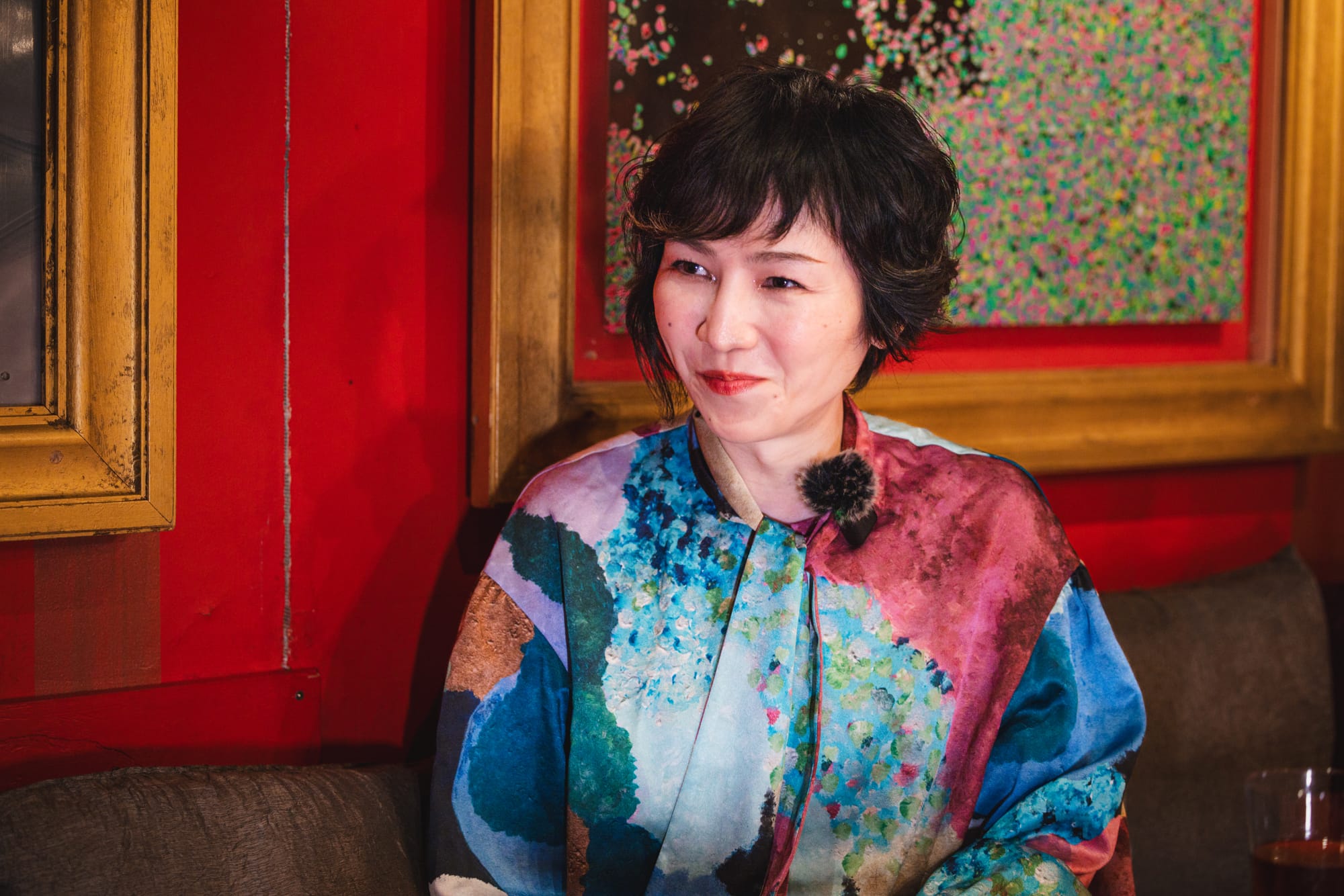
When I discovered José Padilla, I really looked up to him. I bought all of his CDs. At one point, Madonna even listed Café del Mar as one of her favorite CDs. And then José signed with Maverick, Madonna’s label under Warner Music, and released an album. When he did a movie soundtrack licensed by Warner, I went to cover it for a TV interview. I brought all his CDs with me. He was so happy and signed every one of them. He even gave me his contact info in Ibiza. So I went right away. That trip inspired me in so many ways and a lot of what I do now at Shibuya Oiran is rooted in that experience.
What were you feeling after he passed?
As both a DJ and a composer — as someone who creates — my music just [pauses] stopped. I couldn’t keep going. His influence on me was just so deep, it affected everything I did musically. There’s no one like him. No one even comes close. I felt like I had lost my guiding light, and that sense of loss was overwhelming. I would often listen to his DJ mixes on video, or the CDs he had given me. He used to give me everything. When he was DJing and I said, “This track is amazing,” he would just hand it to me. He gave me USBs, CDs…everything. And he always encouraged me.
Losing him… I cried a lot.
There are still many DJs doing Balearic sets now, but none of them have that same emotional resonance, that same exquisite sense of mood and timing. He was radiant in a way no one else is. After he passed, this scene just felt empty. That’s when I knew I had to make this album.
Let’s talk about Love Forever’s creation. What was your creative process to creating the tracks on this album?
After I started using software again, I decided I wanted to make something for myself for the first time. Something personal. Inspiration came from a lot of places. I’ve always been very interested in music that doesn’t follow conventional music theory, for example.
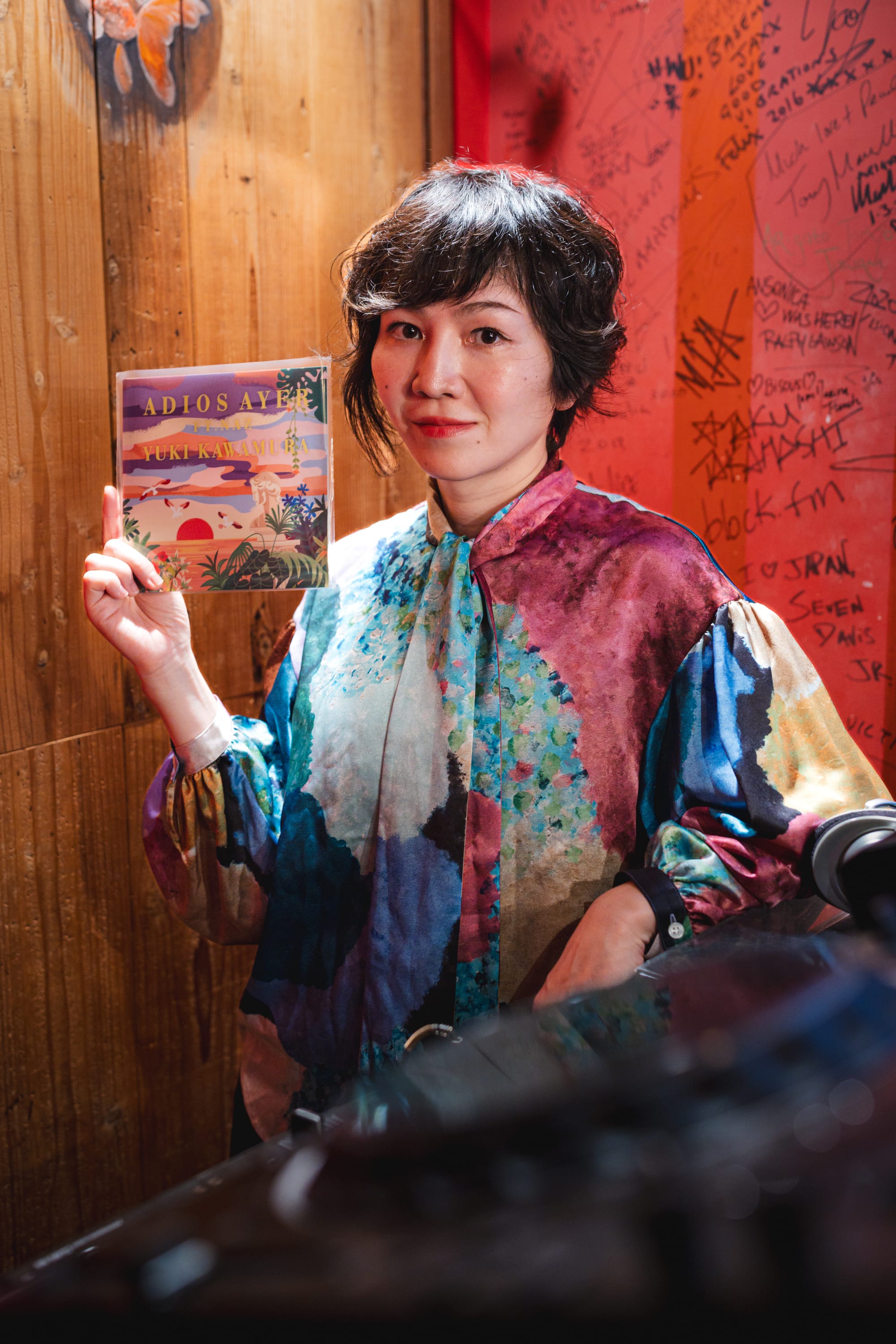
One important moment was the cover of “Adiós Ayer,” the huge hit by José Padilla, which became the second track on the album. The original features vocals by Seal, and I had always wanted to cover it. It’s my absolute favorite song in the world. But touching a song you love the most, it’s a huge challenge.
During the pandemic, I met a singer named Naz who lives in Okinawa. She’s an incredible vocalist, known for working with WONK and Tomita Lab. When I heard her voice, I immediately felt it was like no one else I’d ever heard before. It had a raw, emotional pull that deeply resonated with me.
There’s a strong Balearic movement in Okinawa, and many DJs I love are based out there.
A lot of my close friends are there too. Even Chiaki-san, who did the jacket art for “Adiós Ayer,” is from Okinawa. My husband and I visit often. One time we visited, on the day we arrived, Naz happened to be doing a live show at a friend’s shop. The moment I heard her voice, I just knew she was the one to sing this cover. I offered it to her, and she said yes right away.
Naz was also going through changes in her life, and her emotions matched the feelings in the lyrics of “Adiós Ayer.” At first, I thought of bringing her to Tokyo to record. But then I realized it had to be recorded in Okinawa. Changing the environment might make her feel nervous or change the vibe. So I brought a team down there, and we recorded it in Okinawa. The energy was incredible. Later we also did a live performance together. I thought it turned out to be a perfect, beautiful session.
Now that the album is out, what did you learn about yourself while creating Love Forever? It took several years so I’m sure you learned a lot.
Yeah, it really did take years. So many different phases, creative blocks and emotional moments. Even this conversation we’re having now is also part of the process.
And yes, I did learn a lot about myself.
A single track — you can just release that on its own. But an album is like a story, or a movie. Creating that kind of structure forced me to look at myself objectively. I had to ask myself what kind of world do I want to build through music? What kind of emotional experience do I want to give to the listener?
I named the album Love Forever because I truly feel that in today’s world, love and the idea of “forever” are in such short supply. Balearic music, to me, is music that makes you feel like you’re in paradise. But reality is getting harsher and harsher around the world. So even if it’s just while listening to music, I want people to feel a little happiness, a little peace. I want them to relax, to feel kindness, to feel love and a sense of eternity. I used to have this tendency to write darker songs, sometimes punk, sometimes even aggressive. But this time, I edited myself. The only exception is the track “Magic,” which has a kind of Rimbaud-like poetic edge, but that’s like the spice of the album.
Honestly, by making this album, I feel like I’ve grown so much — as a creator, as an artist.
Even the way I DJ has changed. The kind of DJ I was before making an album and the kind I am now are completely different. It was a huge update to who I am. I feel like I’ve become a storyteller and rediscovered my creative power.
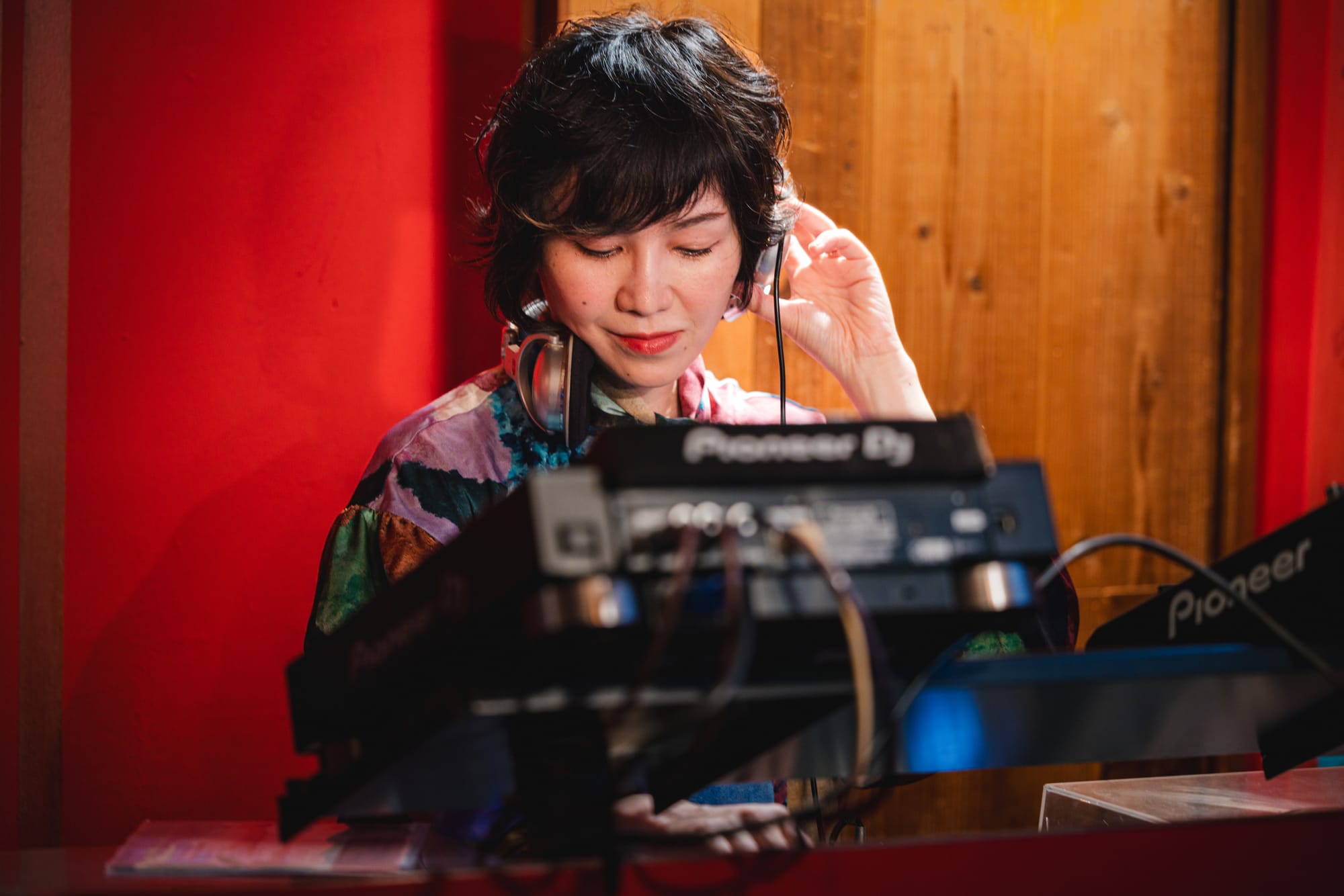
You mentioned DJing. How has your relationship to DJing changed over the years?
When I started DJing in the ’90s, it was a part of youth culture. Both DJs and clubs were expressions of young energy, rebellion and resistance. That was true for me too. I think I was channeling my frustration and my defiance of the world through music. But back then, I never imagined that DJ culture would become something so mature, something that would continue on for decades.
Now, people in my generation and older are still DJing. Japan is an aging society, and there are more and more DJs of all ages. There are many different stages now. And because of where I am in life, my age and my position, I want to express something different through DJing. I want to embrace people. It’s not just about youthful defiance anymore. I want to hold space for all the joy, anger, sadness and happiness life contains. That’s why I think I’m finally getting closer to the essence of Balearic music, the style I was aiming for from the beginning.
I wanted to also spend some time tonight talking about the area Oiran is in. How has the area around here changed over the years, in your opinion?
Oh yeah, it’s changed a lot. Oiran opened in 2010, which was right around the time of the Lehman Shock in 2008. There was this pervading atmosphere of economic sadness at the time. Then came the tightening of Japan’s adult entertainment law (fueiho), which led to an increase in daytime and morning events. That created more opportunities for teenagers to encounter DJ culture. It also meant that DJs had to update their approach. They had to make their sets something even kids could listen to. There was a growing need to build bridges between generations.
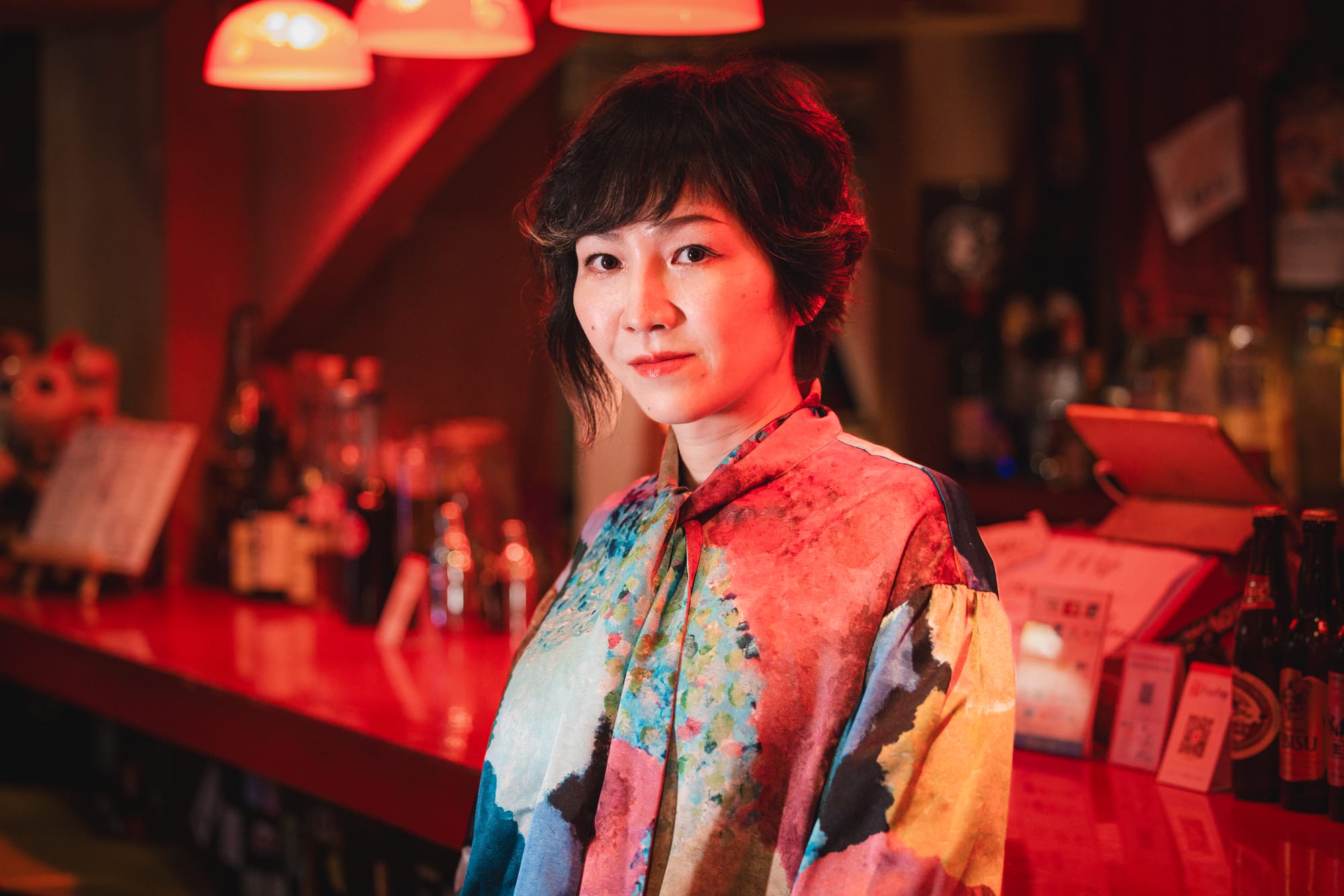
Oiran has always been a “warm-up bar.” Back then, there were hardly any music bars, and the concept wasn’t really trendy yet. There weren’t many DJ bars either, not like clubs. But now, they’ve become more common. It makes me happy to see the style I helped establish in the beginning become more widespread. I create primarily for my own generation. I don’t pander to younger audiences. Sometimes I might even surpass the older generation, but I think it’s healthiest to create for your own age group. Many of my friends no longer go to clubs.
Everyone’s busy with life, but they’re still friends I connected with through music.
At Oiran, they can all come together. It’s got the vibe of a club, but you can drink, chat, and hang out. And you still get to meet the younger generation too. Maybe once a month, when the mood is right, we’ll all go out to a real club. I’m happy I’ve been able to create a space where love can circulate like that. We also introduce our customers to clubs. We share information about places like WOMB and invite DJs to come by. Sometimes we even go out as a group with customers who want to explore more.
How do you feel about Tokyo’s club scene as of late?
After COVID, a lot of clubs and bars shut down. But in their place, smaller venues more like live houses have started to appear. Oiran has seen all these changes in the club scene. It’s sad that many of the big clubs in Shibuya are gone.
One of the negative things is that the scene has become siloed. Each genre now only thrives within its own bubble. There’s less of that cross-genre energy that used to be uniquely Tokyo. These days, if you’re just doing the same thing as other regions, people won’t show up.
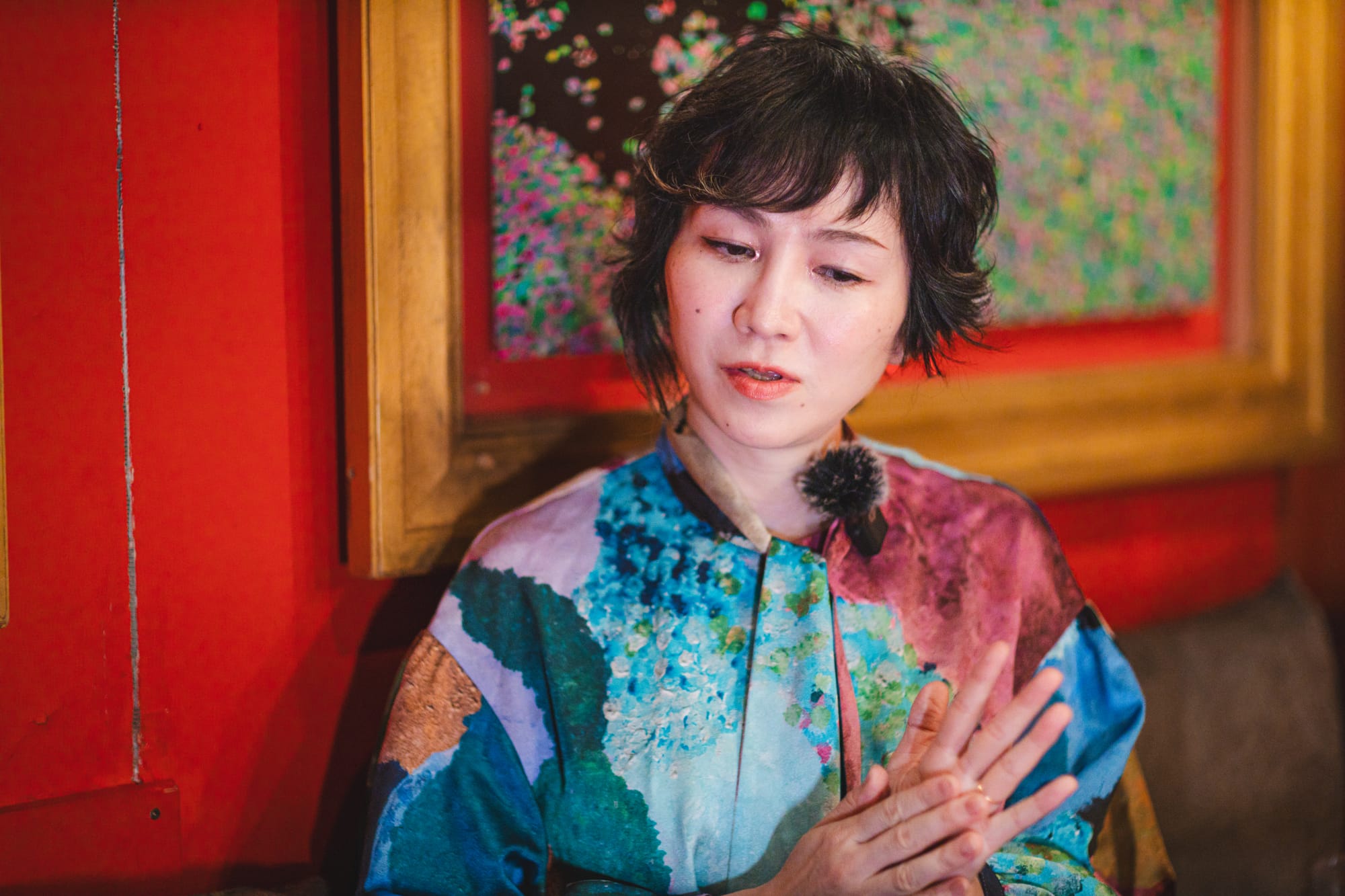
Unless it’s a flashy, big festival-type event, it’s hard to draw a crowd, and that’s disappointing. There are so many amazing local DJs and Japanese artists, but it still feels like there’s a gap in turning that into consistent events or sustainable income. You often hear about Japanese DJs killing it overseas, which is great…but also a little sad.
On the bright side, since the pandemic, there’s been a rise in teenage DJs and creators. Thanks to the evolution of music software, more daytime events, and parties that allow minors or even families with kids, there are more opportunities for young people to actually experience DJing and the culture around it. I’ve heard so many stories of kids who tried DJing at one of these events and then started making tracks or even debuted as DJs themselves. That makes me really happy. DJing doesn’t have to be limited to late night anymore. There used to be this belief that late-night sets were the peak of the culture, but that’s no longer true.
Now, I hope we’ll see more emotionally rich and textured creativity coming from younger generations. That’s why we operate in time slots that allow us to connect with young people and create a healthy kind of excitement at Oiran. I really hope that what people experience — and what I’ve experienced — can blend together with the energy and potential of the younger generation, and that something truly interesting is born from that mixture.
That almost feels like a perfect place to end, but I want to ask one more question. Looking over your whole career, what are you most proud of?
Working on music for Cyberpunk 2077 is up there. It was such an amazing, massive project. To go from Japan’s underground scene to something like that, and be able to do whatever I wanted, and to have that work as-is, it felt really good.
At the same time, it felt like something inside me came to an end with that project. After it ended, I realized I wanted to focus more on making my own music. That experience helped give me the push that led me to start working on Love Forever. I mean, I can make hype tracks too, songs you blast with your friends, have fun and party to. But from that point on, I felt it was time to shift. To start a new chapter. To focus on the kind of music I truly wanted to make. To take full responsibility for it, and do it under my own name.
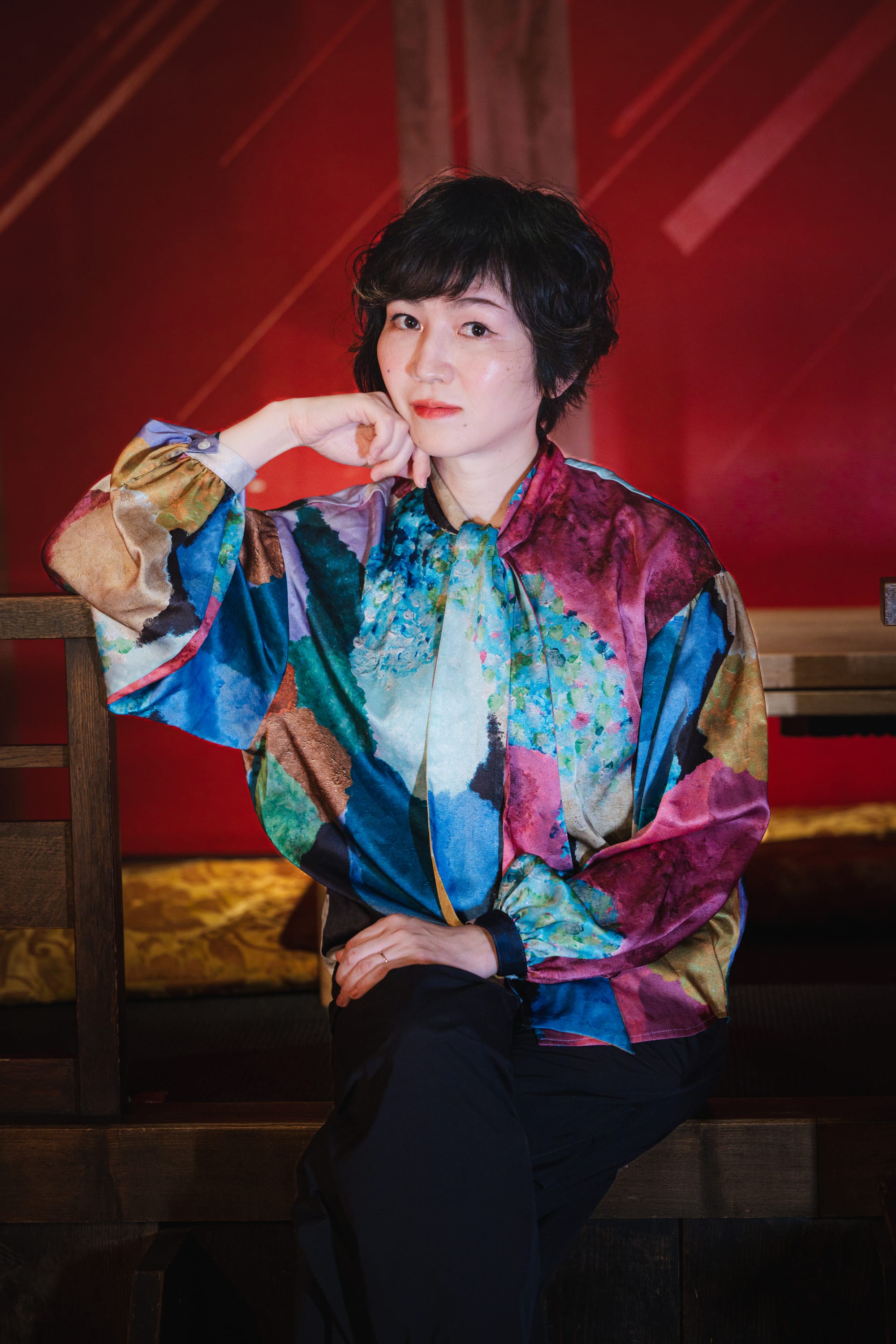
Oh, the other big one was in 2003, I was the first East Asian woman DJ to appear at the Love Parade in Mexico. That’s another moment I’m proud of. I had only been DJing for about three or four years. And suddenly, I was given the chance to perform in front of 100,000 people. To see that view while DJing, it made me feel like I might never top that moment. It was a little sad in a way, but also the best memory of my career.
